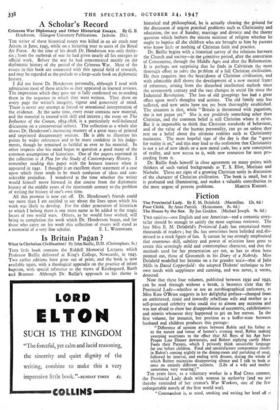A Scholar's Record
Crimean War Diplomacy and Other Historical Essays. By G. B. ' Henderson. (Glasgow University Publications. Jackson. 21s.)
THE writer of these historical essays was killed in an air crash near Athens in June, 1945, while on a lecturing tour to units of the Royal Air Force. At the time of his death Dr. Henderson was only thirty- six ; from the outbreak of war he had'given nearly all his energies to official work. Before the war he had concentrated mainly on the diplomatic history of the period of the Crimean War. Most of the essays in this book are connected with this special field of research, and may be regarded as the prelude to a large-scale book on diplomatic history.
I did not know Dr. Henderson personally, although I read with admiration most of these articles as they appeared in learned. reviews. The impression which they gave me is fully confirmed on re-reading them in the sequence in which they were written. They show on every page the writer's integrity, vigour and generosity of mind. There is never any attempt at forced or sensational interpretation of the evidence. At the same time, every essay contains new material, and the material is treated with skill and interest; essay on The Influence of the Crown, 1854-1856, is a particularly well-balanced discussion on a controversial subject. The collection as a whole also shows Dr. Henderson's increasing mastery of a great mass of printed and unprinted documentary sources. He is able to illustrate his points by wider references and to be more confident in his judge- ments, though he remained as faithful as ever to his material. In other respects also his mind began to question a good many of the common assumptions of historians. One of the papers reprinted in the collection is A Plea for the Study of Contemporary History. I remember reading this paper with the keenest interest when it appeared in 1941. I thought it an excellent short statement of a case upon which there tends to be much confusion of ideas and con- siderable prejudice. I wondered at the time whether the writer would himself move forward in due course from the diplomatic history of the middle years of the nineteenth century to the problem of writing the history of one's own time.
All this promise is now cut off. Dr. Henderson's friends could say more than I am entitled to say about the lines upon which his work was likely to develop. For the older generation of historiaas to which I belong there is one more name to be added to the tragic losses of two world wars. Others, as he would have wished, will bring to completion the work which Dr. Henderson began, and for those who carry on his work this collection of essays will stand as
































 Previous page
Previous page